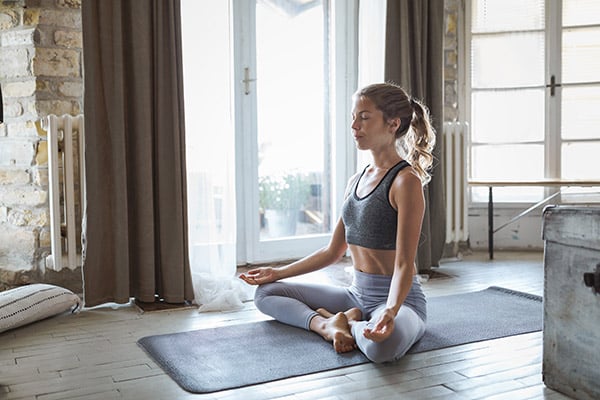
Many group fitness professionals are navigating the current unknowns of the COVID-19 virus and fitness center reopening. The following questions might sound familiar to those in the planning and preparation phase: "When might we reopen?" "What will reopening look like?" "Are we going to be able to reopen safely?" "Is it safe for us to reopen?” For some who might already be back working in a reopened facility, questions might be, “Are we keeping our members safe?", "Will we close again?" "Will, I ever get back to what the job looked like pre-COVID?" In either situation, it is essential to practice Jon Kabat Zinn's mindfulness principles, which include:
- Acceptance
- Non-judgment
- Letting go
- Patience
- Non-striving
- Trust
- A beginner’s mindset.
Mindfulness is a life skill that can be practiced and developed, and knowing how to incorporate these specific principles in one’s life can help reduce stress and increase resiliency. These principles can be applied in fitness center re-entry planning, but also in any time of uncertainty.
Acceptance
The first principle that is helpful to practice is acceptance, or the ability to recognize what is occurring in the present moment (good or bad) without ignoring or denying the challenges or changes. Acceptance can be difficult to do, especially if what is occurring is out of one’s control or is unpleasant.
As individuals navigate the new norm of the fitness role and industry, it is crucial to come to terms with things as they are. For many, the fitness role of programming and onsite appointments and classes might be replaced long-term with virtual offerings.
Additionally, the day might consist of enforcing safety processes and completing additional cleaning requirements instead of focusing on creative onsite programming. Even if an individual understands the necessity of these changes, it might be challenging to accept the new norm.
To practice acceptance, notice any thought or feeling that comes up without ignoring or changing them. Choose to acknowledge what is present, and accept that it is out of one’s control. This can help pave the way for understanding and forward movement. When an individual accepts the present reality, it makes it easier to respond healthily and set appropriate next steps and goals.
Non-Judgement
The second principle of mindfulness is non-judgment. I believe that this is the next principle to refine after practicing acceptance. Once we accept what thoughts and feelings are emerging, we can choose to not judge ourselves for having them. Instead, observe as an impartial witness, and set the goal to be kind to yourself along the way. Think about the example shared here:
A fitness professional has a firm opening date and plan, yet feels hesitant about the safety of reopening. The desire to get back to a sense of normal was there, yet the hesitancy brought up thoughts of fear and concern over actually moving forward with the plan. This is an excellent example of how thoughts can differ and consider both the pros and cons of a re-entry plan. In this example, one needs to witness this contrast without self-judgment or criticism.
Letting Go
The third mindfulness principle is the principle of letting go. Letting go is an approach one can take to let go of any thought that is not productive or helpful. More specifically, stop unhelpful worries that do not aid in preparing or accepting a given situation. This can be hard work, but essential to do.
In navigating fitness center re-entry planning, it is crucial to let go of any unproductive thoughts and/or start the "what-if” spiral. We all know someone who has or have ourselves experienced the spiral of worry that can snowball until we feel overwhelmed. The principle of letting go helps us release that snowball and reduces unnecessary stress and anxiety.
With the pandemic, we need to let go of thinking about any “what if” scenario. We need to stay instead mindful of what we know to be true in the present moment and ask the following questions, “What is the best next step or plan based on what I do know right now?” or “What is happening right now?”
Patience
The fourth principle of mindfulness is patience. We all know what patience is, but to cultivate it as a mindful principle is even more critical. It requires individuals paying attention when patience is hard to muster - notice it without judgment, and consciously choose to breathe deeply in a self-compassionate way.
Slowing down the parasympathetic nervous system to calm and return to a patient attitude can help navigate when things change with the pandemic and impact fitness center planning. Through this process of conscious breathing, one can cultivate patient perseverance when it is needed the most.
Non-Striving
The fifth mindfulness principle is non-striving, which relates to the idea that we should not strive to be someone or somewhere we are not, and that we are currently whole and resourceful. Having this self-belief can help individuals navigate through times of stress or challenge.
With the pandemic, this principle will help fitness professionals know that they have the resourcefulness to handle the changes and uncertainty of local guidelines, fitness center role changes, member policies, and/or fitness center opening preparation. This principle does not mean that we should not strive towards our goals and move toward specific outcomes.
Instead, it means we do not strive to be where we are not, and we know we have everything we need to problem solve and respond to challenges. This relates highly to the sixth mindfulness principle, which is trust.
Trust
The sixth principle of trust means cultivating a fundamental conviction and confidence in oneself and one’s abilities. In navigating the current situation, it is essential to trust our intuition, inner guidance, and skills, even if mistakes are made.
Additionally, cultivating a sense of trust and self-efficacy can help you stay present and connected to the best next steps.
Keeping a Beginner's Mindset
The last mindfulness principle that will help us navigate through fitness center re-entry requires keeping a beginner’s mindset. When we keep the mindset of a beginner, we are free of expectations, judgments, and maintain a curiosity to understand and learn more deeply.
With this approach, we are open to the possibility of what we do not know yet. This state of mind helps us be present through the ever-changing fitness center guidelines and following recommendations instead of thinking from the past or future.
To summarize, all these principles are powerful allies to all, especially fitness professionals, to help them practice mindfulness as they experience role changes, focus on re-entry preparation and planning, and/or navigate the pandemic as a whole.

